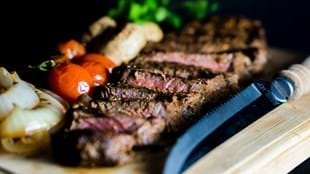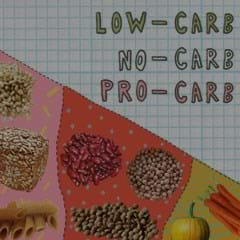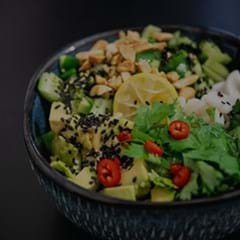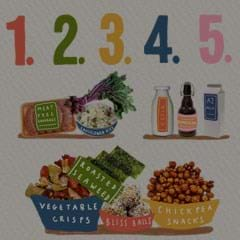Red meat’s been in the spotlight lately. If it’s not being recreated in vegetable form it’s being singled out as one of the biggest risks to the future health of the planet.
Earlier this year a major report published in medical journal The Lancet aimed to come up with an optimal diet for both human health and the sustainability of life on Earth. Chief among its recommendations was that we drastically cut our red meat consumption – down to as little as 16 grams a day, or one small portion a week.
The EAT-Lancet report certainly fueled the conversation about how our food is produced, and helped remind us that human health is inextricably linked with the health of the planet. Eat to look after one, and you’re likely to look after the health of the other, too.
On top of that came another study linking the consumption of red meat with increased bowel cancer risk. Examining the diets of over half a million UK residents, the research looked at their red meat consumption in particular, finding a strong association between red and processed meat intake and cancer risk.
So what’s the deal with meat? Should we give it up completely? What about the low-carb diets that rely on it? Here are ten pros and cons to consider.
1. The more you eat the higher the risk
In the most recent research, those who ate an average of 76 grams of red and processed meat each day had a 20 percent higher risk of bowel cancer than those who ate just 21 grams per day. For every 50 grams of red meat people ate, their risk of colorectal cancer increased by 18 percent. For processed meat (ham, salami, cured meat, fast foods) the increase in risk was 19 percent for every 25 grams.
2. Less is definitely better
To put that in context: 25 grams of processed meat is about one rasher of bacon, or a slice of ham. Fifty grams of red meat is about one thick slice of roast meat, or the edible portion of a lamb cutlet. 76 grams of red meat is less than one small steak.
3. But the difference isn’t huge
Context is important. These numbers translate as follows, according to Cancer Research UK: for every 10,000 people who ate 21g of red and processed meat a day, 40 were diagnosed with bowel cancer. Eating 76g of processed or red meat a day was associated with eight extra bowel cancer cases.
4. Keep processed meats to an absolute minimum
You could look at that and say “hey, I like those odds, pass the bacon”. But it’s worth noting this builds on what’s already known about red and processed meats and cancer risk. The World Cancer Research Fund (WCRF) has looked at the science and recommends we eat no more than moderate amounts of red meat, such as beef, pork and lamb, and eat little, if any, processed meat.
5. It isn’t just about cancer
Research has found associations between high levels of red meat consumption and other diseases such as heart disease and diabetes. A large 2012 study found those who consumed the highest levels of both unprocessed and processed red meat had the highest risk of all-cause mortality, cancer mortality and cardiovascular disease mortality. The researchers estimated that substituting red meat for one serving per day of other foods – such as fish, poultry, nuts, legumes, low-fat dairy and whole grains – could lower the risk of mortality by 7-19 percent.
6. Try to keep it in perspective
Again, it’s important to note we’re talking about relative, not absolute, risk. There are still far more risky things you can be doing and consuming that will have more of an effect on your health – smoking and alcohol, for a start.
7. We don’t really know why red meat is a risk
Experts are not sure why red meat might elevate risk of disease. It’s possible it may come from the saturated fat or iron it delivers. It may also be down to potentially cancer-causing compounds generated when cooking red meat at high temperatures. Or it might be sodium (salt) related. Red meat eaters may also be more likely to have other risk factors for diseases.
8. Just a little can still be good for you
On the other hand, none of these experts are recommending we give up red meat altogether. That’s because it’s a nutritious, useful food. The WCRF says meat can be a valuable source of nutrients, in particular protein, iron, zinc and vitamin B12.
9. Red meat is high in vital nutritional ingredients
Protein provides satiety; it helps us feel full and it helps build muscle and other tissues. Iron is important for energy, immunity and to carrying oxygen around the body. Iron deficiency can be a real problem, especially for young women, and red meat is a really good way to efficiently get enough iron. And vitamin B12 is vital to keep our nerve and blood cells healthy. It’s only found in animal foods and again, red meat is a good source.
10. Don’t forget your vegetables
The WCRF recommends that if we do eat meat, we keep it to around three portions a week; equivalent to about 350-500 grams (about 12 to 18 ounces), cooked weight. It’s also important to eat lots of plant foods as well, including legumes and whole grains, which are known to lower the risk of some cancers.
In the end, we don’t need to eat red meat for health – and for some of us, cutting down will be a good way to improve overall health. But we don’t have to give it up, either. If we want to eat it, paying attention and keeping our red meat servings small and occasional will mean we can still have our steak and eat it too.
Niki Bezzant is a New Zealand-based food writer, editor and commentator. She is the founding editor (now editor-at-large) of Healthy Food Guide magazine, and is currently president of Food Writers New Zealand and a proud ambassador for the Garden to Table program which helps children learn how to grow, cook and share food. She is a member of the Council of Directors for the True Health Initiative, a global coalition of health professionals dedicated to sharing a science-based message of what we know for sure about lifestyle and health.
If you want more health and fitness inspiration simply sign up to Fit Planet and get the freshest insights and advice straight to your inbox.







